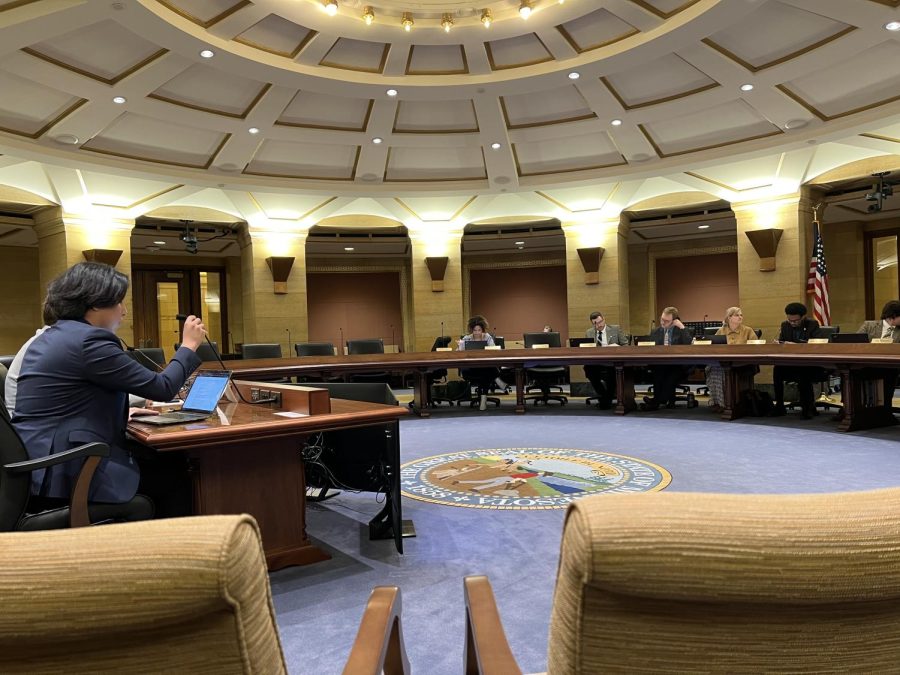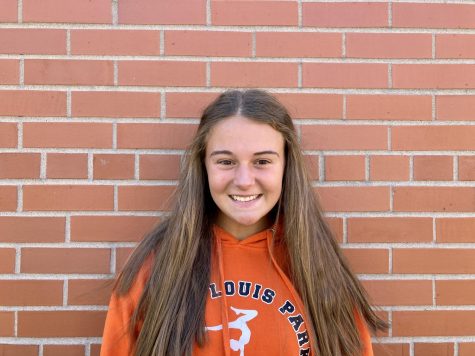Kevin Martinez Herrera presents testimony at MN capital
Senior advocates for career pathway classes and equitable access to higher education
April 11, 2023
During your testimony, you spoke on your personal life and all that has influenced you to be where you are today. Based on those experiences and mentors, what led you to this path of advocacy?
My passion for this subject started my junior year when I took Revisiting Ethnic Studies with Ms. Cisco and IB History of the Americas with Mrs. Merkle. They are both wonderful teachers, and in their own ways, they opened my eyes to racial disparities, racial injustice and looking at our world and society through a racial lens. Being a voice and leader of the Latino Students Association and responsible for meeting with the principal, superintendent and School Board to create equality and change has always been important to me and is what has led me to discover the importance of advocacy.
What was your initial goal in testifying? What was your focus in presenting your cause?
My initial objective in testifying was to have our lawmakers know from a high school experience what it is like to be an underrepresented BIPOC (Black, Indigenous, Person of Color) walking through the hallways of a school. As it pertains to access to education and searching for opportunities in professional fields, such as health care, people who are a part of BIPOC communities aren’t always represented. I wanted lawmakers to have racial consciousness as they make those decisions that influence BIPOC students’ futures.
What made you want to share your experience?
Sharing my testimony stemmed from my personal experiences and the experiences of fellow classmates, specifically from those who shared their own testimonies when I took Heritage Speakers. It was a class where Latino students and those of similar heritages had the space to share their struggles. Upon being in that class and getting to know other stories, I wanted to advocate for them and even for those who don’t have a voice.
What was your experience like at the capital? How did it feel to be able to have the platform to speak and meet so many influential people?
At first, I was nervous because there were all of these lawmakers — the GOP on one side of me and the DFL on the other. There were cameras everywhere. But, once I sat there and had the microphone in front of me, I knew I had to do it because it was really important for our school. It was an honor to represent SLP High School because no one has done it before in this way.
In what ways do you think further talking about this topic and advocating for these Career Pathway classes for all students will help better our community and other communities?
It is important to advocate for things like career and readiness programs because many schools don’t have the same opportunities that we have as SLP students. Because of that, these classes and programs are really valuable. We need to invest in resources and in BIPOC students so that they can have a chance and the same opportunities, or leverage, as other people in order to pursue professional careers, whether that is in health care, business, engineering or something else.
In what ways was this experience meaningful for you?
This experience showed the path on the political side of advocacy. I had the opportunity to learn more about my interest in health care and ethnic studies by developing and presenting my testimony, as well. It made me realize how important and valuable advocating for a better future for other people is to me.
Do you have any plans for further discussing this topic?
I would definitely go back to the Senate or the House of Committees if they need me again because they were really driven by my testimony, and they were glad to see both sides of the aisle come together. As for my future, I am looking to pursue health care and become a dermatologist one day.
You expressed how important the State Grant Program for college accessibility is for you. Would you like to share a little more on your experience on that and why you chose to testify on behalf of it?
Currently, one of the many reasons many of my peers and students in this high school are stressing during college acceptances relates to being able to afford higher education and get financial aid packages. As students, we should not be worrying about money. We should be focused on going to school and pursuing our own pathways. And, like I said in my testimony, there is nothing wrong with using the tools at our disposal from the government in order to create education for everyone.
How did it feel to know that your words and story made an impact?
Initially, I was really happy. In our day and age, we are all so politically divided, and it seems that there is no partisanship. Because of this reality, I was really excited to see everyone come into agreement and support of this. It is so important for us, as high schoolers who are trying to find who we are and who we will become — who are trying to find careers that interest us and access to quality education.
What is your vision for the future in consideration of your testimony and advocacy? What do you want to see from Minnesotan leaders and from Park?
I would say, all political leaders need to experience a high school setting. They need to come to schools and walk in the hallways because they are the ones sitting in power and making decisions that affect us. They don’t always know what it is like to be a student in these modern times, and that is why they need to listen to us. I hope that in the future we can disrupt systems of oppression and strive for equity. In the upcoming April, I am going to be talking more on this subject with the superintendent.




